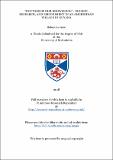"Doctors of our knowledge" : kinship, research, and embodiment in an Amerindian village in Guyana
Abstract
Ethnography of how people in Surama—a mostly Makushi, Amerindian Village in the North
Rupununi of Region 9 in Guyana—conceive of “work” as social formation, “development” as a local
manifestation, and knowledge tied to being supports an argument that foreign power is obviated
through the formation of similar bodied kin in the community.
The focus on a single community, Surama, is a methodological choice born out of previous
anthropological understandings of community-settlements as fluid, comprised of consanguineal kin,
and leadership as non-coercive and limited to each community. Today, Amerindian Villages are
spatially fixed, and administered by Village Councils—the most local branch of government. To
understand how people in Amerindian Villages conceive of politics and kinship today, I had to myself
become more familiar. I resided in one community, with one family. I took part both in what my
hosts described as “tradition”, and “development”.
People in Surama described tensions in changing ways of being social. While they champion sociality
associated with “tradition”, they manifested “development” as a contribution to the wider world. In
this way, they carried what they considered proper social personhood, sharing and willingful
contributions, to the wider world.
People in Surama conceive of “tradition” and “culture” through a history of mediating outside
researchers’ and policy-makers’ interest in their lives. They recognize foreign interest in their visible
knowledge of the forest, and share this knowledge through these concepts. Simultaneously, these
concepts keep certain ways of knowing distant from researchers. Embodied ways of knowing and
interacting with persons in the forest are called “belief”, and are limited to believers. My hosts
maintained this as a fundamental difference in our ways of knowing. Their knowing is a doing with
kin; ours is writing about that doing. Through extending their knowing and ways of being social to
researchers, however, they turn us into similar bodied kin.
Type
Thesis, PhD Doctor of Philosophy
Collections
Items in the St Andrews Research Repository are protected by copyright, with all rights reserved, unless otherwise indicated.

